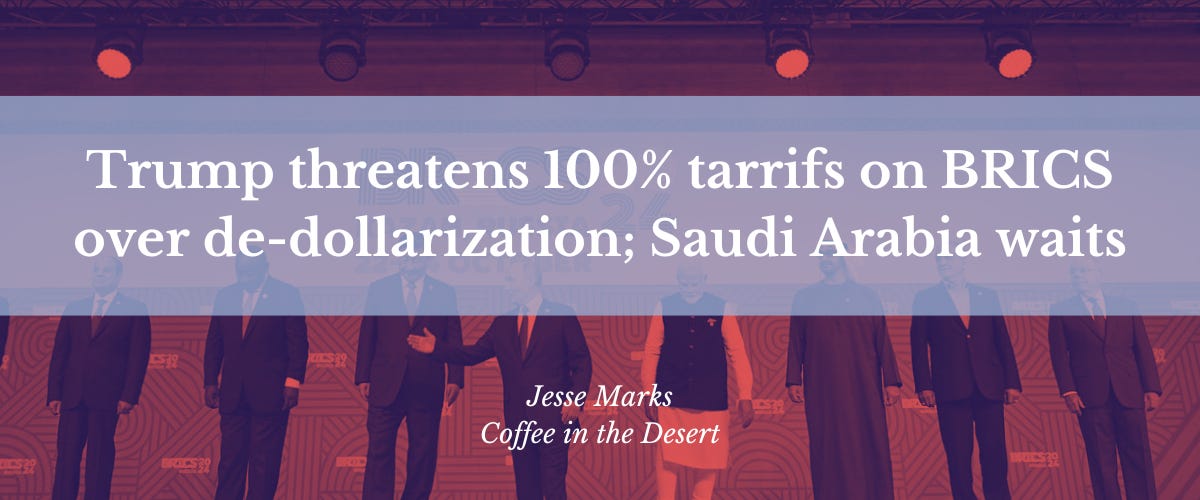Trump threatens 100% tarrifs on BRICS over de-dollarization; Saudi Arabia waits
President-Elect Trump announced on social media his intention to impose a 100% tariff on BRICS nations—Brazil, Russia, India, China, South Africa, and their newer additions, Egypt, Ethiopia, Iran, and the UAE—if they move forward with creating a new currency to challenge the U.S. dollar's global dominance. The announcement signals a continuation of Trump’s previous strategy of aggressive economic statecraft, aimed at deterring rivals from undermining the dollar's role as the world’s primary reserve currency.¹
For some BRICS member countries, the push to create an alternative currency is more than a symbolic challenge; it reflects a growing frustration with U.S. financial hegemony, particularly following sanctions against Russia in 2022. Those sanctions highlighted vulnerabilities for countries heavily reliant on the dollar. Critics have accused the U.S. of weaponizing its currency, making alternatives more appealing for nations wary of similar economic coercion. While the idea of a BRICS currency has momentum, there are questions about its viability, given the disparate economic systems and priorities within the bloc.²
Trump’s response fits broadly into his previous strategy of using tariffs as leverage, as seen in trade disputes with China, Canada, and Mexico during his presidency. The move will appeal to domestic constituencies who remain concerned about maintaining U.S. economic dominance and are weary of growing calls for de-dollarization. Trump’s approach could spark trade wars early into his second term that could have ripples across the global markets.³ Moreover, with the dollar still accounting for 58% of global foreign exchange reserves, experts believe its position as the dominant reserve currency is unlikely to be meaningfully threatened in the near term.⁴
One notable dynamic is Saudi Arabia’s decision to remain on the sidelines of full BRICS membership. Despite its close ties with other Gulf members like the UAE, Riyadh appears to be hedging its bets, unwilling to commit to a bloc if it risks antagonizing the U.S. during a period of negotiations over a U.S.-Saudi security arrangement. That said, Saudi Arabia is deeply invested in diversifying its economic partnerships, particularly as part of its Vision 2030 agenda. KSA may maintain observer status rather than immediate full membership with BRICS, but the Kingdom retains the option to join at a later time. This approach allows Saudi Arabia to preserve its ability to assess the feasibility of the bloc’s currency ambitions, while retaining its strategic flexibility.
Endnotes
¹ "Trump threatens 100% tariff on the BRIC bloc of nations if they act to undermine US dollar," Associated Press, November 2024. Available at: https://apnews.com/article/8572985f41754fe008b98f38180945c3
² "Trump is now threatening 100% tariffs on the BRICS group," Business Insider, November 2024. Available at: https://www.businessinsider.com/trump-tariffs-brics-nations-trade-war-us-dollar-2024-11
³ "Trump threatens BRICS nations with 100 percent tariff," Politico, November 2024. Available at: https://www.politico.com/news/2024/11/30/trump-brics-tariff-trade-00192042
⁴ "International Monetary Fund data on global foreign exchange reserves," IMF, 2024.




